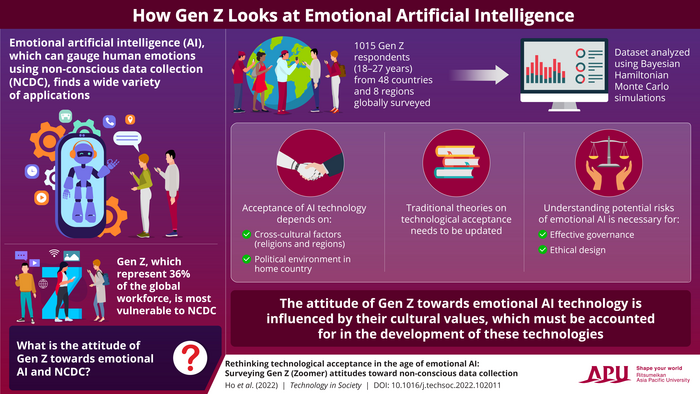Artificial intelligence (AI) governs all that come under “smart technology” today. From self-driving cars to voice assistants on our smartphones, AI has ubiquitous presence in our daily lives. Yet, it had been lacking a crucial feature: the ability to engage human emotions.
The scenario is quickly changing, however. Algorithms that can sense human emotions and interact with them are quickly becoming mainstream as they come embedded in existing systems. Known as “emotional AI,” the new technology achieves this feat through a process called “non-conscious data collection”(NCDC), in which the algorithm collects data on the user’s heart and respiration rate, voice tones, micro-facial expressions, gestures, etc. to analyze their moods and personalize its response accordingly.
However, the unregulated nature of this technology has raised many ethical and privacy concerns. In particular, it is important to know the attitude of the current largest demographic towards NCDC, namely Generation Z (Gen Z). Making up 36% of the global workforce, Gen Z is likely to be the most vulnerable to emotional AI. Moreover, AI algorithms are rarely calibrated for socio-cultural differences, making their implementation all the more concerning.

“We found that being male and having high income were both correlated with having positive attitudes towards accepting NCDC. In addition, business majors were more likely to be more tolerant towards NCDC,” highlights Prof. Ghotbi. Cultural factors, such as region and religion, were also found to have an impact, with people from Southeast Asia, Muslims, and Christians reporting concern over NCDC.
Research by Team:
“Our study clearly demonstrates that sociocultural factors deeply impact the acceptance of new technology. This means that theories based on the traditional technology acceptance model by Davis, which does not account for these factors, need to be modified,” explains Prof. Mantello.
The study addressed this issue by proposing a “mind-sponge” model-based approach that accounts for socio-cultural factors in assessing the acceptance of AI technology. Additionally, it also suggested a thorough understanding of the potential risks of the technology to enable effective governance and ethical design. “Public outreach initiatives are needed to sensitize the population about the ethical implications of NCDC. These initiatives need to consider the demographic and cultural differences to be successful,” says Dr. Nguyen.
Overall, the study highlights the extent to which emotional AI and NCDC technologies are already present in our lives and the privacy trade-offs they imply for the younger generation. Thus, there is an urgent need to make sure that these technologies serve both individuals and societies well.

